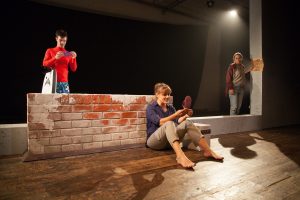45 Downstairs, Melbourne
Reviewed on May 26, 2017

Tim Winton is an award – winning Australian writer, taking the prestigious Miles Franklin Award, a record – breaking four times. He has authored works of fiction, non – fiction, short stories, as well as books for children. His most noted novels include ‘Shallows’ (1984), ‘That Eye, The Sky’ (1986), ‘Cloud Street’ (1991) and ‘Dirt Music’ (2001).
Winton is also a playwright, with three plays, ‘Rising Water’ (2011), ‘Signs Of Life’ (2012), and ‘Shrine’ (2013), published in quick succession.
With its single act running at ninety minutes, ‘Shrine’ is a challenging piece of drama. Winton explores uncomfortable topics such as familial loss, obsessive love, and survivor’s guilt, all in searing detail. At times, the tale makes for harrowing viewing.
Constructed like an oversized jigsaw puzzle, it is often up to the audience to reconnect the pieces. Teasing viewers with snippets of information, while the script does not fill in all of the gaps, it feeds us with enough clues to follow the overall motivation. Further, the actors connect with the narrative and each other through the use of overlapping dialogue. Shifting back and forth between first and third person focus, speech patterns are conversational, spare and yet, hauntingly poetic.
Adam and Mary Mansfield are an ordinary couple, coping with the tragic and untimely loss of an only child. Their teenage son, Jack, recently died in a automobile accident, leaving them with many unanswered questions. (I found it interesting to learn that Winton also survived a car crash as a youth. Meaning, his writing here potentially comes from a parallel place of truth and pain.)
We slowly learn that the two other passengers in the incident, Ben and Will, have been told to keep quiet by their lawyer. Otherwise, their current and future prospects may be in jeopardy.
Added to the mix, is the character of June Fenton. Branded as the town outcast, she also happens to carry a secret torch for Jack. A ‘chance’ meeting between the two, sets the inevitable wheels in motion. She ultimately becomes the catalyst in the ensuing disaster.
‘Shrine’ also covers how time stops cold for the immediate family.
The grieving process never ends. It isn’t a matter of getting over what has happened, but finding strategies to cope. Motion pictures such as ‘Enduring Love’, ‘Interiors’, ‘Ordinary People’, ‘Rabbit Hole’, ‘September’, ’The Safety Of Objects’, ’21 Grams’, and ’What Dreams May Come’, also deal with this topic in similar fashion.
Perhaps, that is why ‘Shrine’ feels quite filmic in its delivery.
Leon Salom’s deceptively simple set design, combined with Kris Chainey’s subtle lighting, play on Winton’s ethereal lyricism. Together, they make smart use of 45 Downstairs’ versatile performance space.
A central wooden frame acts as a both a dividing wall and proscenium between the audience and the stage. Twin recurrent themes, the sky and the sea, are presented via an oversized black backdrop. A faux brick platform glows red hot and ice blue, depending on the mood being conveyed. Props such as wine glasses and groceries, are kept to a bare minimum. With its foreboding tone, subtle sound design plays a key part in fronting the play’s inclement weather.
Marcel Dorney’s direction is pointed and clear. In his capable hands, the cast of six are portrayed never less than fully – formed individuals.
Keith Brockett (as Ben) and Nick Clark (as Will) communicate the questioning split required to make their performances work. Their actions here are typical of the pack – wolf mentality, that separates privileged classes from those less fortunate.
As Jack, Christian Taylor hovers in the periphery, ghost – like for the first half of the show. Once his story becomes central to the piece, we understand through Taylor’s subtle choices, how this sheltered, almost naïve young man is swayed and influenced by peer pressure.
Tenielle Thompson’s June is potentially the most puzzling and mysterious character. At odds with her self – perception, she is also a bundle of contradictions. June’s understated craving for place, is desperate as it as sad. Here, Thompson reminded me of Rachel Griffiths’ Brenda Chenowith, from HBO’s ‘Six Feet Under’. In that instance, Griffith’s sociopath pursued Nate Fisher (Peter Krause) with similar relish.
Chris Bunworth as Adam, is a man adrift.
After his son’s death, he refuses to see Jack’s memory (made by teenage friends), reduced to a makeshift cross covered with stubbies and beer cans. No longer up to running a business, Adam sells off his beloved winery. Meanwhile, drinking himself into slow oblivion with wine from a basement cellar. Bunworth communicates his loss, knotting rage with typical male stoicism.
Alexandra Fowler gives a career – defining performance as Mary. A mother’s loss is never resolved, and particularly during the speech where she first learns of the terrible news, and at the funeral itself, Fowler’s display is gut – wrenching.
As presented by Kin Collective, this is an accessible, high – concept piece. Abstract and symbolic in equal measure, their sensitive rendering stays in mind long after the final bows are taken.
Image Source: Broadway World
